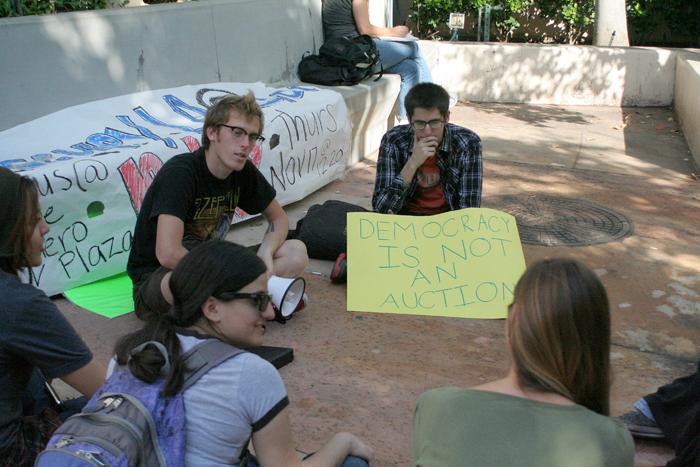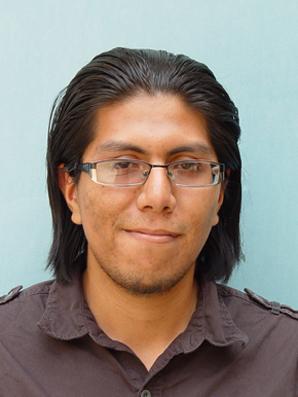Occupy LA at GCC held a teach-in at the faculty lounge on Nov. 10 to inform students of the events and policies leading to the dissent of the American public and the creation of the movement in general.
“The ‘Occupy the World’ movement is a social protest movement that is consistent with America’s core values at their best. [It] addresses the tremendous and growing class inequality,” said history professor Gordon Alexandre.
Alexandre opened the teach-in, explaining the purpose and history of teach-ins and what the GCC teach-in was meant to achieve.
Alexandre gave a brief background about his history with protests in the 60’s and added his own personal experience to the lecture, recalling the teach-ins held at UC Berkeley and those where political activist Tom Hayden spoke against the Vietnam War. Hayden is known for his role in the antiwar and civil rights movements of the ‘60s.
“[One of the] predecessors we had for [today’s] teach-ins were those held against the Vietnam War,” said Alexandre.
However, Alexandre expressed the importance of patience when it comes to revolution.
“You can’t expect a young movement to attract thousands of people overnight,” said Alexandre.
Hoover Zariani, Center for Student Involvement director, opened the teach-in with a lecture on the changes in legislation that have allowed corporations to warp the face of politics
According to Zariani, in 2008 Citizens United, a conservative nonprofit organization, wanted to air a film criticizing then-presidential nominee Hillary Clinton around the time of the presidential nominations.
The Federal Election Commission banned them from releasing the film, since they said it conflicted with the regulations of the McCain-Feingold Act, a bill preventing the release of broadcasting political material funded with corporate money around the time of political events like primaries.
Citizens United decided to sue, said Zariani, and the case made it to the Supreme Court, which overruled the commission’s decision, saying that corporations had the same free speech rights as corporations. It became legal for corporations to give money to nonprofit organizations that support candidates willing to pass legislation favorable to corporations.
“It’s basically buy-a-politician, to be blunt about it,” said Zariani.
In addition, corporations can anonymously donate money to nonprofit organizations like Citizens United, said Zariani.
“How many people can they reach? They can potentially reach the whole nation,” said Zariani. “They have unlimited power.”
Zariani also explained that there was a loophole in which foreign countries can contribute to campaigns via company shareholders in other countries.
The FEC states that foreign countries cannot donate money to campaigns. However, since the nonprofit organizations don’t have to disclose the identity of their donors, there is no way to tell where money comes from.
Zariani also gave statistics on where the members of the Senate and the House of Representatives stand economically. According to the Center for Responsive Politics, a nonpartisan research group, more than half of US senators and members of the House belong to the top 10 percent of nation’s wealth holders.
However, Zariani is hopeful that things will change.
“Money is influential, but it’s not everything when you have stupid candidates (on the Republican side),” said Zariani. “Money’s always going to influence things but there’s always things we
can do to change that.”
Guest speaker and KPFK radio host Ankur Patel spoke next, stressing the importance of being informed and of participating in the political process.
“We graduate people from high school who can’t read or do math,” said Patel. “[The One Percent] want to keep us dumbed down and medicated.”
Patel, who hosts a show called “Civic Circus” on KPFK radio dealing with Los Angeles politics, says that politics has become a joke.
“It’s amazing to me that we’re giving such stupid candidates media time for their sex scandals,” said Patel, referring to sexual harassment claims brought up against Republican presidential candidate Herman Cain.
Corporate greed has tainted politics from all sides, said Patel.
“It doesn’t matter what the color of your skin is if the only color you think about is green,” said Patel.
He called the ‘Occupy’ protesters an army, waiting to be mobilized.
“We have to understand the scope of the game,” said Patel. “The One Percent writes the laws. The 99 Percent should be writing the laws.”
Next was Esteban Gil from Students Occupy Los Angeles, who started with a “Human Mike Check” — a chanting exercise developed to combat megaphone restrictions and promote crowd unity.
“MIKE CHECK!” Gil shouted, and the crowd chanted back, “MIKE CHECK!”
After the mike check, Gil gave a small history of how revolutions in Europe and South America formed the general assembly used in the Occupy movements today.
“When you enter into a general assembly, you need to set your [perspectives] aside,” said Gil.
A general assembly, according to Gil, is how leaderless movements come to a consensus on decisions. A person makes a proposal to an issue and the crowd responds and debates the merits and faults of the proposal. Then, a new or reworked proposal is brought up, and people debate it again until a general consensus is reached.
“The idea is to ensure participation,” said Gil.
Gil also explained hand signs that told people the atmosphere of the crowd — waving one’s hands back and forth for approval of ideas, arms crossed and raised for a “hard block” sign of dissent, and the self-explanatory “irrelevant elephant” — making a trunk with one’s arm and waving it.
“It’s silly now, but wait until you’re talking about politics to 18,000 people,” said Gil.
Occupy LA at GCC education committee members Luke Ponnet and Tom Wales then gave a speech on the effects that the economic downturn has on society.
“The system is ill,” said Ponnet. “The One Percent controls 25 percent of the country’s wealth.”
“That 1 percent is the true evil,” said Ponnet. Stating that people like David and Charles Koch (better known as the Koch brothers) were to blame for the current economic plight. The Koch brothers are the holders of the largest private company in the US, Koch Industries, and are avid supporters of conservative policies and politicians, raising millions of dollars to pass legislation and elect officials sympathetic to their views.
“It’s an abuse of our Democratic and Republican democracy,” said Ponnet. “Trickle-down economics don’t work.”
As a result of legislation passed favoring corporations, spending cuts affecting the general public have reduced the standard of living, said Ponnet. For example, funding for education keeps getting cut, and students are the ones who pay the price.
“From the 1960s to around 2001, the California community college system was the best in the United States,” said Ponnet. “Now you have students with $25,000 to $35,000 in debt by graduation.”
“In order for change to occur, the populace can’t conform to what’s going on,” said Wales.
“I want you to challenge everything, to think about everything that everyone said,” said Wales.
To ensure the movement lives, there needs to be a sense of unity.
“The national unity that this country had is now gone. We’re very segmented,” said Wales. “I don’t want the Occupy movement to be short-lived, to kill ourselves before we’re killed.”
Alexandre returned for a discussion on the long-term goals of the Occupy movement and what he felt should be demanded by the movement of Washington.
In order for the movement to survive, the Occupy movement needs to “remain independent from Republicans and Democrats,” continue occupying public spaces and having public events, said Alexandre.
Among the several things that Alexandre called for were the reinstatement of the Glass-Steagall Act, which would create greater control over banks, the passage of the Employee Free Choice Act, which would make it easier for workers to form and organize unions, promote universal healthcare, reduce student debt, and reverse the Citizens United vs FEC ruling.
Sociology professor Richard Kamei was the last speaker, wrapping the teach-in with a discussion of the economy and how it led to the current state of the country.
“[There has been] too much spending and not enough regulation,” said Kamei.
Kamei also stated that the One Percent will attempt to harm the movement.
“Those in power will do three things,” said Kamei. “They will first dismiss and ignore the movement, then they’ll try to smash the movement.”
“Those in power tend to overreact,” said Kamei.
A question and answer session was held by Alexandre and Kamei to conclude the teach-in at 3 p.m.
The teach-in, organized by Occupy LA at GCC events committee members Sarah Gould and Jessica Farrell, brought in approximately 150 students throughout the day with the room being full at 40 to 60 students at a time.
“I understood better about what the Occupy Movement was,” student Gabby Isidro said. “After going to the teach-in, I felt like getting involved more and attending the Occupy LA and their general assembly.”
“I believe students need to know about the movement,” said Gould, “because it’s an umbrella of other issues such as rising tuition, the war and current politics.”
Alexandre said that the Occupy movement and the reasons for its existence would remain an issue for a long time.
“The Occupy Movement isn’t going away,” said Alexandre. “It’s essentially outside of colleges. It’s a worldwide movement.”
“I call it the purging of our idiocy,” said Gil.


